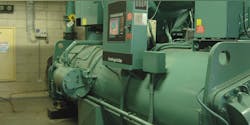How Magnets Are Improving Centrifugal Chillers
Two of the biggest concerns for budget-minded facility managers are how they can make systems run more efficiently and how to reduce maintenance costs and time. With HVAC systems, one technology that can do both is magnetic-bearing chiller compressors. Centrifugal chillers have traditionally used oil as a lubricant for the bearings, but that causes some problems for facility managers.
Systems that use oil as a lubricant create wear and friction, which causes systems to run less efficiently. But with magnetic-bearing systems, the bearings are cushioned by magnetic forces and can move more freely. “The magnetic bearings allow the compressor to operate without the use of oil for lubrication, which reduces energy losses due to friction and increases the heat transfer efficiency of the chiller because no oil enters the evaporator or the condenser,” the Department of Energy (DOE) explains.
When they were implemented in the GSA’s Green Proving Ground (GPG) program, this technology resulted in an overall energy savings of 42.3%, which provided a payback period of less than five years compared to a comparable rotary-screw chiller.
With magnetic-bearing chiller compressors, efficiency and maintenance are linked together because of the reduction of friction. Magnetic systems require considerably less maintenance because they reduce metal-on-metal contact of traditional systems. They reduce friction throughout their entire operation. According to the General Services Administration, “The new compressor also features a ‘soft-start’ capability to reduce start-up stresses that contribute to long-term maintenance issues.”
Flexibility is the name of the game in HVAC, and magnetic-bearing chiller compressors are also traditionally lighter and quieter than their oil-using counterparts, which means they are ultimately more flexible. Their reduced size and sound allow them to be installed easily in a number of locations.
Is a Magnetic-Bearing Chiller Right for Your Facility?
DOE provides the following tips for those considering a magnetic-bearing chiller compressor:
- Conduct an inventory of existing chiller compressors.
- Identify older chillers that are due to be replaced.
- Create a replacement schedule and evaluate the feasibility of magnetic bearing chiller compressors when chillers are being replaced
Monitor the energy savings associated with the compressor. If savings are evident in only a few locations, identify what's different about those locations and replicate in similar locations.
